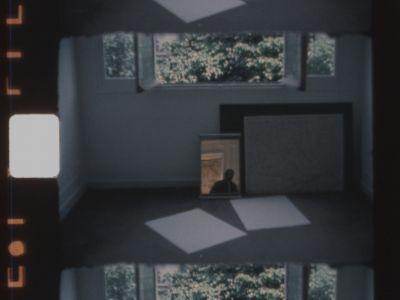Film Screening: two films by Jean-Claude Rousseau
A rare screening of two films by Jean-Claude Rousseau presented by Screen/Society and the Duke Experimental Film Society
“Ever since the late eighties French filmmaker Jean-Claude Rousseau has been a name commonly attached to the most adventurous…type of filmmaking. Far from the American, well-established niches of experimental film, he has been working sparsely in Europe (and Japan) for over thirty years becoming a sort of mythological, solitary figure for this continent’s avant-garde." – Mubi Notebook
Jeune femme à sa fenêtre en lisant une letter(1983, 45 min, France, Super 8mm to DCP)
“Through the window, we cannot distinguish the scene: a street, a canal, a view of Delft, perhaps a port. We are on the inside, with the light pouring in. The maps on the wall are bigger than the paintings, yet we do not know where we are. The woman stands at the window reading a letter. She loses track of location as she reads. She could be anywhere, at any random point on the map. Outside. Through the window, we cannot distinguish the scene: a street, a canal, a view of Delft, perhaps a port. We are on the inside…” – Jean-Claude Rousseau
“[F]rom my first film [Jeune femme à sa fenêtre en lisant une letter], what I looked for was unity, inside of the [Super 8] cartridge. As if every cartridge was a brick in the composition, in the construction of a film. This can only be done on Super 8. … I like to use the word brick. To make a sort of building with the bricks of Super 8 cartridges.” – Jean-Claude Rousseau
Keep in Touch(1987, 25 min, France, 16mm)
Sitting at a table, the filmmaker is in a room in New York. Various messages on an answering machine are heard: whispers punctuated by a “love, love”, a voice seeking an appointment. The film tells the vacancy, the time between the meeting and the wait.
"Keep in Touch explores waiting periods. The filmmaker sits at a table in a room in New York, blank stationary paper in front of him. He turns on a lamp, leafs through an erotic magazine. Meanwhile, we hear various messages left on an answering machine: whispers punctuated by “love, love, love”; switching French to English, the voice tells of a move back into an old apartment. Another, in English, surprised by the answering machine, half-heartedly solicits a second date. The film explores this pause; the time between the initial encounter and the waiting period. The persistent hum of the city is perceptible, pierced by an ambulance siren.” – Érik Bullot
“For over thirty years, Jean-Claude Rousseau has built one of the most unique works of French auteur cinema, as intimate as [it is] mysterious, between documentary and fiction. He has collaborated with Jean-Marie Straub and Danièle Huillet who admired his work.” – Close-Up Film Centre
"[Rousseau's] oeuvre...deals constantly with the most primary elements of cinema: composition, movement, trace, and light, as if in every single shot of his films he wanted to make us reconsider what we normally take for granted about these concepts. Nevertheless, much more interested in cinema’s ends than in its mediums, Rousseau’s extremely rigorous but romantic approach to art reminds us less of structuralist filmmakers such as Ernie Gehr or Michael Snow—of whom he talked wonders, off the record—than of other free artists from the past centuries that would at first seem far removed from his practice: Johannes Vermeer, Paul Cézanne, or Robert Bresson. His is a concern for sensuousness, freedom, profundity.” – Mubi Notebook

- 2020 Campus Dr
- Durham, North Carolina 27708
- Time: 7:00 PM
- Location:
Rubenstein Arts Center, Film Theater - Admission:
FREE admission -
Contact:
Hank Okazaki - hokazak@duke.edu
- Website
- Add to calendar: Ical, Google